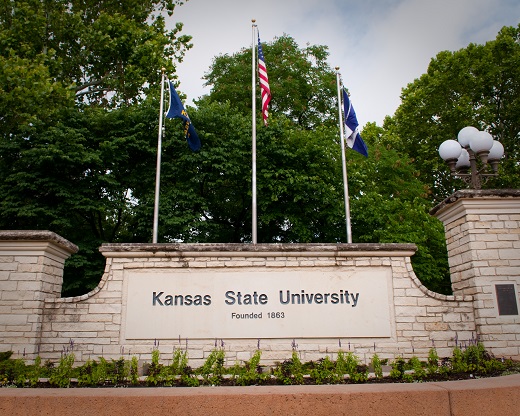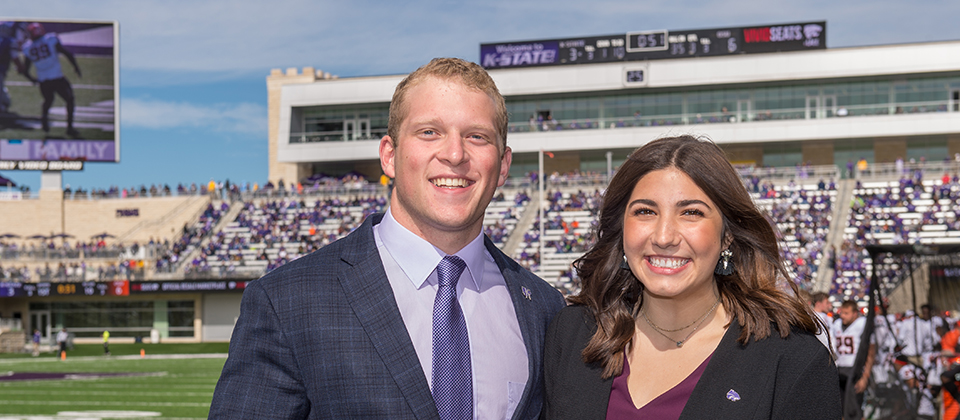10/24/18
K-State Current - October 24, 2018
K-State Current is a weekly news update for the Kansas Board of Regents to apprise the Regents on a few of the many successes and achievements made by K-State faculty, staff and students.

K-State News
Mosquito immunity research gets boost from network science with $2.8 million NIH grant
 Network science may be the answer to understanding how mosquitoes are able to transmit diseases and unveil a framework for biological control of the insect.
Network science may be the answer to understanding how mosquitoes are able to transmit diseases and unveil a framework for biological control of the insect.
Kansas State University's Kristin Michel, associate professor in the Division of Biology, is the principal investigator for a recently awarded $2.87 million National Institutes of Health grant that will use genetics, biochemistry and network science to understand mosquito immune response.
"Mosquitoes have to combat many different types of infection and prevent constant attack from pathogens encountered through their blood meal," Michel said. "At the same time, mosquitoes must be able to regulate their overzealous immune response and prevent it from attacking valid bodily functions. This balance is necessary for any organisms' immune system, including humans."
According to Michel, mosquitoes have more than 7 million potential protein-to-protein interactions responsible for shutting down or activating immune system responses, which provide an ideal system to research how complex information networks function.
"This grant will allow us to get a 30,000-foot view of the mosquito's immune system," Michel said. "We can use network analysis to understand how all these interactions are integrated, visualize the data and make predictions as to how a mosquito's immune system will be activated if we shift the system."
Among the many attempts to control mosquitos as carriers of deadly human pathogens are avenues that can affect the mosquito's immune system, such as entomopathogens, or fungi that act as parasites to kill or disable insects. According to Michel, a better understanding of the mosquito's immune system can help aid decisions for proper biological control of diseases.
Michel is working with Kansas State University's Mike Kanost, university distinguished professor of biochemistry, and Caterina Scoglio, LeRoy and Aileen Paslay professor of electrical and computer engineering; and Mike Osta, associate professor at the American University of Beirut. The interdisciplinary team will help bridge vector biology and genetics with protein biochemistry and computational modeling to answer questions about mosquito immunity.
"This effort requires expertise in multiple scientific disciplines and collaboration to investigate a very complex system by which mosquitoes mount and regulate immune responses to pathogens," Kanost said.
The research will help biologists understand the mosquito's immune system better and advance network science. Computer and mathematical calculations will simulate how proteins are connected during mosquito immune responses to provide an innovative representation of a multilayer network.
"While network analysis of a single-layer is well-studied, the analysis of multilayer networks presents theoretical challenges," Scoglio said. "The goal of our work will be to infer missing links, detect critical protein types, and determine the network robustness."
Mosquitoes' immune systems are made up of a cascade of protein and enzyme reactions, Michel said. Very few of those reactions are understood and may influence other cascades in the system. Network science can help sort out the complexity and visualize the potential for how to interrupt the system.
"In this sea of interactions, or potential interactions, we can use the network analysis to figure out which interactions are really critical to the mosquito's immune response," Michel said. "Then, if we use things in the field to kill mosquitoes, we can make predictions of how the mosquito's immune system would shift from that manipulation."
"This network is crucial in regulating the mosquito immune response to parasites such as those that cause malaria and other microbes," Osta said. "The work will provide novel insights into the immune mechanisms that regulate parasite survival in its mosquito vector."
'The Hate U Give' author Angie Thomas to visit Kansas State University

Angie Thomas, author of "The Hate U Give," will visit Kansas State University in February 2019 to talk about activism and the themes of her best-selling novel.
"The Hate U Give" is the 2018 Kansas State University common book and is an award-winning and best-selling novel that has been adapted to a recently released major motion picture movie.
Thomas' talk, titled "Finding Your Activism and Turning the Political into the Personal," will be at 7 p.m. on Friday, Feb. 15, at Bramlage Coliseum. The event will be open to the public and free to attend, but a ticket will be required. More information about tickets will be released closer to the lecture date.
"Angie Thomas' debut novel 'The Hate U Give' has become a powerful cultural phenomenon across the nation, and the chance to hear her speak on our own campus will be one of the must-see events this school year," said Greg Eiselein, professor of English and director of K-State First, the university's first-year experience program.
Thomas' talk is co-sponsored by the K-State Book Network, or KSBN, the Diversity Programming Committee and the English department's student honorary society, Sigma Tau Delta, among others.
"'The Hate U Give' provides our campus an excellent opportunity to infuse diversity, inclusion and social justice into the curriculum to prepare our students for global citizenry," said Bryan Samuel, the university's chief diversity and inclusion officer.
Thomas' novel tells the story of a 16-year-old girl named Starr Carter. Starr has grown up in an urban, poverty-stricken neighborhood and attends a suburban prep school. After she witnesses a police officer shooting her unarmed friend, she must find a way to share the truth of her experience for her family, friends, community and herself.
"We are thrilled that Angie Thomas will be visiting Kansas State University in February," said Karin Westman, chair of the KSBN PR/Events Committee and department head of English. "Given the release of the film 'The Hate U Give' this fall and the debut of her second novel early next year, we are lucky that she can spend an evening with us."
Thomas is the inaugural winner of the Walter Dean Myers Grant 2015, awarded by We Need Diverse Books. Born, raised and still living in Jackson, Mississippi, she is a former teen rapper and holds a Bachelor of Fine Arts in creative writing from Belhaven University and an unofficial degree in hip-hop.
KSBN chose "The Hate U Give" as the university's common read for 2018 following campus wide conversations and review by the KSBN selection committee, comprised of 48 faculty, students and staff from colleges and units across the university's campuses.
"'The Hate U Give' has created a lot of opportunities for thoughtful discussion on our campus and I'm so grateful that it was selected," said Tara Coleman, chair of KSBN and associate professor at K-State Libraries. "This is the first time we've had an author visit in the spring, and it has opened up some wonderful opportunities for community involvement."
For more information about the K-State Book Network, visit k-state.edu/ksbn.
A limited number of tickets will be available for high school classes to attend the Angie Thomas lecture. These classes also can participate in campus visits while they are in Manhattan. High schools and instructors interested in this opportunity can receive more information by contacting Tara Coleman at ksbn@k-state.edu.
K-State Faculty Highlight
Two prolific researchers and educators at Kansas State University are recipients of the 2018 Commerce Bank and W.T. Kemper Foundation Distinguished Graduate Faculty Award.
Being recognized with the award for their outstanding scholarly achievements and contributions to graduate education at the university are Kimberly Kirkpatrick, professor of psychological sciences, and T.G. Nagaraja, university distinguished professor of diagnostic medicine and pathobiology. Both professors will receive a $2,500 honorarium. The awards are supported by the William T. Kemper Foundation and the Commerce Bancshares Foundation, and are coordinated through the Kansas State University Foundation and the university president's office.
"This year's recipients, Drs. Kirkpatrick and Nagaraja, are faculty members who excel in research and in the teaching and mentoring of K-State students," said Shawn Drew, market president and CEO of Commerce Bank, Manhattan. "They exemplify the outstanding graduate-level faculty members at K-State that Commerce Bank and the W.T. Kemper Foundation have been proud to recognize for more than 20 years."
As part of their award selection, Kirkpatrick and Nagaraja will each give a public presentation on their work. Nagaraja will make his presentation at 3:30 p.m. Thursday, Oct. 25, in the Big 12 Room at the K-State Student Union. Kirkpatrick's lecture will be at 3:30 p.m. Tuesday, April 23, in 4061 College of Business Building.
Kirkpatrick is director of the psychological sciences department's Cognitive and Neurobiological Approaches to Plasticity center, which is known as CNAP. The center, funded by a $10.6 million grant from the National Institutes of General Medical Sciences, currently supports four primary projects, three pilot projects and three research cores. Activities related to the project are taking place at Wichita State University and the University of Kansas Medical Center. CNAP also supports six K-State students on graduate research assistantships and provides access to laboratory facilities that are used by more than 50 graduate and undergraduate students.
Kirkpatrick's main research interest is the role of timing and reward processes in determining maladaptive impulsive and risky choices in rats. Her National Institutes of Health R01 grant, which was originally funded in 2010 and renewed in 2016, supports research on the development of targeted therapeutic interventions to treat impulsivity. Altogether, she has had more than $4 million in funding for her research programs, has published nearly 70 research papers and book chapters, and has co-authored more than 100 conference abstracts and delivered nearly 40 invited addresses and symposium contributions. She has served as a reviewer for more than 30 journals, is currently on the editorial boards of four prominent journals, and served as associate editor for the journal Behavioural Processes from 2014-2016.
Passionate about mentoring undergraduate and graduate students and postdoctoral fellows, Kirkpatrick has been the major professor for six doctoral students and one master's recipient. She has mentored five summer research students, more than 100 undergraduate researchers and five postdoctoral fellows. Five of her graduate students have received extramural fellowships, including one of her current students who is the recipient of a National Science Foundation Graduate Research Fellowship.
Kirkpatrick regularly publishes with her students, with nearly 50 percent of her publications involve student co-authors. She also supports students in attending and presenting at national and international conferences, with more than 80 percent of her conference presentations involving student co-authors. Her graduate students have garnered multiple awards, including an Ig Nobel prize, two University Distinguished Professor research awards, two Department of Psychological Sciences Research Awards, and dissertation and early career awards from the American Psychological Association.
Kirkpatrick received her doctorate in psychology from the University of Iowa in 1995 followed by a postdoctoral fellowship from 1996-2000 at Brown University. She joined the K-State faculty in 2008 as an associate professor and was promoted to full professor in 2012.
Nagaraja is a highly regarded researcher on the gut microbiology of cattle. Supported by extramural funding of more than $11 million — predominately from the U.S. Department of Agriculture and noted animal health companies — Nagaraja's work has focused primarily on the role of rumen microbes in function and dysfunction of the rumen, particularly liver abscesses of cattle and on foodborne pathogens, with a focus on Shiga toxin-producing Escherichia coli and Salmonella in cattle. His work has resulted in seven U.S. patents.
Nagaraja's research is a blend of basic and applied studies and involves collaborative interactions with epidemiologists, molecular biologists, pathologists and ruminant nutritionists. He and his associates have made significant contributions in the following areas: use of ionophore antibiotics in cattle; causes, pathogenesis and vaccine development for liver abscesses in feedlot cattle; causes and preventions of ruminal disorders such as acidosis and bloat; ecology of Shiga toxin-producing Escherichia coli and Salmonella in cattle; and antimicrobial resistance and antimicrobial alternatives. Nagaraja and his associates have published 19 book chapters, 14 review papers, five symposia proceedings and 214 peer-reviewed journal papers.
While research makes up 60 percent of Nagaraja's appointment, he also teaches the Veterinary Bacteriology and Mycology course and lab for second-year veterinary medicine students, Ruminant Digestive Physiology to first-year veterinary medicine students and the graduate courses Rumen Metabolism and Rumen Microbiology. He also serves as director of the College of Veterinary Medicine's doctoral program in pathobiology and the master's program in veterinary biomedical science.
Nagaraja has mentored 19 doctoral, 19 Master of Science and three Master of Public Health students, as well as several postdoctoral students and visiting scientists.
His many awards and honors include the Dr. Ron and Rae Iman Outstanding Faculty Award from the K-State Alumni Association in 2012; being named one of Kansas' top 150 scientists by Ad Astra Kansas in 2011; and the Irvin Youngberg Award for Applied Sciences, one of the Higuchi-KU Endowment Research Achievement Awards, in 2010. Nagaraja also received the 2001 Pfizer Animal Health Award for Research Excellence from the College of Veterinary Medicine. He is an honorary diplomate of the American College of Veterinary Microbiology.
Nagaraja received his bachelor's and master's degrees in veterinary microbiology from the University of Agricultural Sciences in Bangalore, India. He earned a doctorate in microbiology from K-State, and joined the faculty in 1979. He was named a university distinguished professor, K-State's highest ranking, in 2008.
K-State Student News
Two students chosen as 2019 K-State Student Ambassadors

Two students have been chosen to represent Kansas State University as the 2019 Student Ambassadors.
Maddy Mash, junior in microbiology and pre-medicine, Wichita, Kansas, and Tel J. Wittmer, sophomore in secondary education, Holton, Kansas, were announced as the ambassadors Oct. 13 during halftime of K-State's Homecoming football game against Oklahoma State University.
Established by the K-State Alumni Association in 1977, the Student Ambassador program elects one male and one female student each year to represent the student body at Alumni Association events throughout the state and at university activities.
Mash and Wittmer will visit with prospective students and alumni; attend Student Alumni Board meetings and activities; assist with programming on campus such as the Alumni Fellows program, All-University Homecoming Committee and other special events; and assist the President's Office as needed.
Mash and Wittmer were elected during Homecoming Week by a student vote from a group of six semifinalists. The ambassadors serve a one-year term, and each receives a $1,500 scholarship, clothing from Manhattan clothing store Borck Brothers and an official K-State ring from the Alumni Association.
Typically, ambassador candidates excel academically and are extensively involved in volunteer and philanthropic activities. Mash and Wittmer are role models for these qualities.
Mash is a member of Alpha Xi Delta sorority. She has served her sorority as member development vice president, new member orientation director, sisterhood director and assistant academic director. Additionally, she is a pre-health ambassador, New Student Services ambassador, 2018 K-State Orientation and Enrollment leader and is a member of Silver Key Sophomore Honorary and Big Brothers Big Sisters. Mash is the daughter of John and Jeny Mash.
Wittmer is a member of the Student Alumni Board and Student Governing Association, serving as a student senator and caucus leader for the College of Education and vice chairman of the Travel Allocations Committee. Additionally, he is a New Student Services ambassador and a 2018 K-State Orientation and Enrollment leader. Wittmer is the son of Rod and Shannon Wittmer.
"Like their predecessors, Tel and Maddy have a strong love for our university," said Alan Fankhauser, assistant director of alumni programs and adviser to the ambassadors. "The Alumni Association is excited to host them at our upcoming events for the year. We look forward to when they have the opportunity to meet more of the K-State family."
For more information on the Student Ambassador program, click here.
Communication sciences and disorders student team wins conference quiz bowl
Four graduate students in the communication sciences and disorders program recently won the inaugural Prairie Cup Praxis Bowl during the Kansas Speech-Language-Hearing Association's conference in October.
The bowl is comprised of teams of graduate students from all four Kansas universities with a communication sciences and disorders graduate program: Fort Hays State University, Kansas State University, the University of Kansas and Wichita State University. The competition includes seven rounds where teams must answer questions relating to professional topics from the Praxis exam — the national exam for speech-language pathologists.
The K-State team included Ashley Edelman, Ellen Bodine Franken, Megan Griffith, Jessica Sutton and alternate Hannah Carlgren. They won each of the seven rounds and were named the overall bowl winners.
"This event was a great opportunity for our graduate students to celebrate all their learning and hard work," said Carrie Leonhart Fratecelli, clinical assistant professor. "It was so exciting to watch current students, faculty and alumni cheer on the teams from across the state — and for K-State to bring home the trophy. We're so proud of how knowledgeable and prepared our students are for their future careers."
The communication sciences and disorders program is housed in the School of Family Studies and Human Services in the College of Human Ecology. Communication sciences and disorders is the academic program for the profession of speech-language pathology. It is for students interested in human communication — speech and language, reading, writing and hearing — and swallowing for individuals across the lifespan. The program offers both undergraduate and graduate education for the profession of speech-language pathology.
K-State's master's education program in speech-language pathology is accredited by the Council on Academic Accreditation in Audiology and Speech-Language Pathology of the American Speech-Language-Hearing Association.